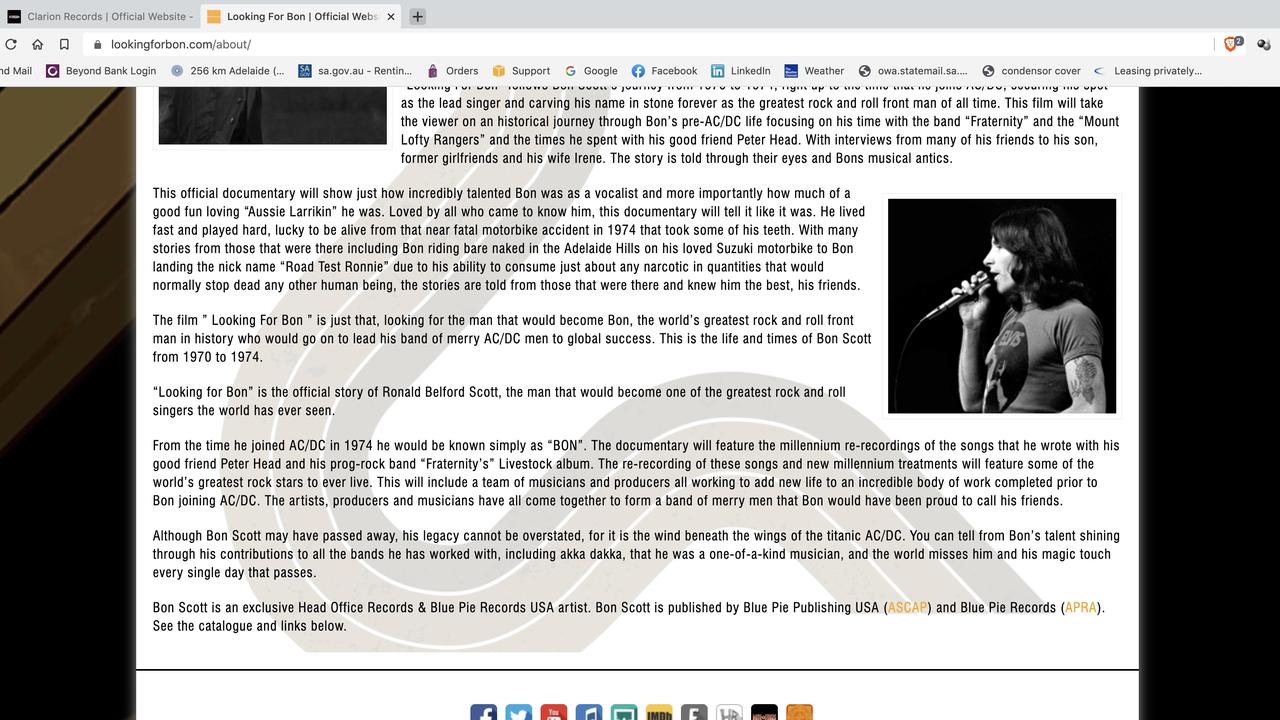Australian company Blue Pie Records facing liquidation over tax debt amid allegations of unauthorised use of music
A music company which has denied claims of using artists’ music without permission is now facing the possibility of being ordered to go into liquidation.

EXCLUSIVE
A music company which has denied claims of using artists’ music without permission is now facing the possibility of being ordered to go into liquidation.
News.com.au previously revealed that Blue Pie Records, a multimedia company involved in music production, licensing, publishing and distribution headquartered in Moss Vale, in NSW’s Southern Highlands, had left an unhappy trail of artists in its wake who said their music was taken without their knowledge or permission. Blue Pie Records denied this, saying in some cases mistakes had been made while in others they still had the rights to the music.
Blue Pie Records has a number of entities including Blue Pie Records USA LLC, Blue Pie Productions USA LLC, Blue Zebra Digital, Blue Vault Digital, Blue Pie Meta Data Services, Meta Data Content Services and Ordior Meta Services with offices in the US and Australia.
Now news.com.au can reveal a company that is part of the embattled group, Blue Zebra Digital, is also under fire from the tax department over an unpaid $209,000 debt.
A subsidiary, Blue Zebra Digital, which trades under a number of different names including Blue Pie Records, Blue Pie Productions, Planet Blue Pictures and Ordior, is due in the Federal Court later this month on February 23 to face a winding up application.
Blue Zebra Digital’s sole director, Damien Reilly, told news.com.au he fully intended to repay the debt and is negotiating a payment plan with the ATO.
News.com.au has also unearthed the tumultuous past of the Blue Pie Records group of businesses and its director, which has seen several companies collapse while it’s been revealed Mr Reilly went to jail decades ago.

Blue Zebra Digital appointed restructuring partners, Gavin Moss and Henry Kwok of restructuring firm Chifley Advisory, in June last year.
But they were unable to come to an agreement with creditors and resigned in August, they told news.com.au.
Mr Reilly said that no staff had been impacted by the company’s debt and that all superannuation is up to date.
“Importantly, the ATO is the sole creditor, as all other creditors have been paid out in full,” he told news.com.au.
But in an embarrassing revelation for the government, Blue Pie has been the recipient of a number of taxpayer funded grants despite its current tax deficit.
A Regional NSW spokesperson confirmed to news.com.au that Mr Reilly’s Ordior business had received $300,000 in 2021 under round one of the Regional Job Creation Fund.
Blue Pie Records is currently being considered for the Export Market Development Grants Program funding from the Australian Trade and Investment Commission (Austrade).
Mr Reilly said they had already “successfully secured” this grant.
“We appreciate the support provided by government initiatives, which enables us to further contribute to the growth and success of our export endeavours and creating jobs for Australians in the media and arts sector,” he said.
Do you know more or have a similar story? Get in touch | alex.turner-cohen@news.com.au


In 1990, Mr Reilly was found guilty of fraudulent misappropriation of money in NSW.
He was sentenced to two years and eight months in jail.
Mr Reilly said “no comment” when news.com.au asked him about it.
ASIC records show that three companies that Mr Reilly ran entered into administration or liquidation in the past decade.
Mr Reilly said this was a “flow-on effect” of the Global Financial Crisis.
“We barely survived it, like most of Australia,” he said.
“Those businesses were never able to recover, a couple of others did.”
In 2010, Ordior Pty Ltd went into liquidation with debts of $442,000 to unsecured creditors.
All the creditors were several other Blue Pie entities and Mr Reilly. The company has since been deregistered.
Then Blue Vault Digital appointed administrators in 2012.
The company had debts of around $361,000 but Mr Reilly purchased back Blue Vault Digital for just $46,500.
This perfectly legal practice is known as a Deed of Company Arrangement or a DOCA, and allows a business to wipe its debt and reclaim control if creditors agree to the amount offered.
In the case of Blue Vault Digital, creditors were paid 7c for every dollar they were owed.
The tax office was one of the creditors, as was Mr Reilly, his wife, and several related companies.
Blue Vault Digital still trades to this day. Mr Reilly’s wife is currently the director but was not involved at the time the company was in administration, nor was she involved with Ordior Pty Ltd and Magic Blue Property Pty Ltd.
Another company Mr Reilly ran, called Magic Blue Property Pty Ltd, collapsed in 2015, owing $2.7 million to 16 unsecured creditors.
The Australian tax office was one of the creditors, according to accounts paid by the company. Magic Blue Property has since been deregistered.
In 2014, a petition to bankrupt Mr Reilly was filed but was later dismissed, according to the National Personal Insolvency Index.
ASIC documents show there are several businesses of which Mr Reilly is currently the director in Australia – Blue Zebra Digital, Blue Pie Meta Data Services Pty Ltd, Meta Data Content Services and Ordior Meta Services Pty Ltd.
Meanwhile, Blue Pie USA LLC is a registered company in the US state of Nevada and with offices in Delaware.

Ex staff speak out
News.com.au has also spoken to several former Blue Pie staff members on the condition of anonymity.
One ex-employee, James*, who worked there during the pandemic, said “it was like a revolving door” because of high staff turnover.
Once, he said a worker quit after just one day.
Several staff were on wage subsidies, according to James, and others were unpaid interns.
Fabian* was an unpaid intern for a year and made a complaint to the Fair Work Ombudsman over his concerns.
He said he did not receive much in the way of training or learning, and essentially worked a salaried position without pay.
Blue Pie Records said it had handled the workplace complaint from years ago.
Mr Reilly denied there was a high staff turnover though he did “recall one person leaving after a day” but said he believed there were “other factors” at play.
The company had engaged a number of interns from all over the world, according to Mr Reilly, providing them with “employable skills and office experience”.
“We are regionally located and aware that there are limited work opportunities in the creative industries,” he said.
“For this reason, we have a formal intern training program, with formal agreements, NDA, and employment conditions including lunch being offered.”

Allegations of unauthorised use of music
It comes after a news.com.au investigation exposed a number of musicians who claimed Blue Pie Records had used their work without permission, which the company has denied.
News.com.au spoke to two artists who believed they had missed out on lucrative record deals because they claim Blue Pie Records had distributed their music without their permission or knowledge.
When they went to sign an exclusive deal with a record label, they couldn’t, because their music was already all over the internet.
Ann-Marita Garsed, a Norwegian musician living in the US, said the record label had been angry to find that her music was already on Blue Pie’s website and other distribution channels. They promptly pulled the deal.
Ms Garsed had sent Blue Pie Records one CD for one song to be used in a charity compilation, but all the CD’s songs were then all uploaded online and it took more than a decade to get it taken down.
“It’s like you’re stuck with it (Blue Pie) for life. It left a bad taste in my mouth and a lot of distrust,” Ms Garsed told news.com.au. “I’m terrified that this is going to happen again.”
Likewise, US musician Frank Rogala said he was on the brink of signing over a $7000 record deal when he looked up his music online and realised it was being distributed by Blue Pie Records.
He had to bow out of the record deal as a result.
Blue Pie Records said they had since taken the music down and apologised for what happened to Ms Garsed, while saying they never had any direct contact with Mr Rogala.


Two other musicians said they sent demo tapes to Blue Pie Records. This was only intended to provide a taster of their music but ended up on the Blue Pie Records catalogue.
“I had to change my name,” Alex Martin told news.com.au from North England.
“They were demos, they weren’t finished.”
Another artist, Phil Munro, claims he had a similar experience in the early 2000s after being asked to send through some remixes to the Aussie music company.
“Later on I found that Blue Pie had released those without my permission,” he told news.com.au.
“Anyone who listened to it would think ‘they sound like sh*t’. They weren’t meant to be for release. It’s pretty poor form.”
Blue Pie said it was unaware the artists were unhappy and encouraged them to contact the company.
Blue Pie also mistakenly claimed exclusive rights to the Bon Scott estate on its website, when this is not the case.
“Blue Pie has never had any relationship, association or affiliation with either Bon Scott personally or his Estate,” Sonic Rights, the agency actually responsible for the rights, said in a statement to news.com.au.
The Australian music company said this was an error due to updating their website and that it had since been corrected.
alex.turner-cohen@news.com.au




